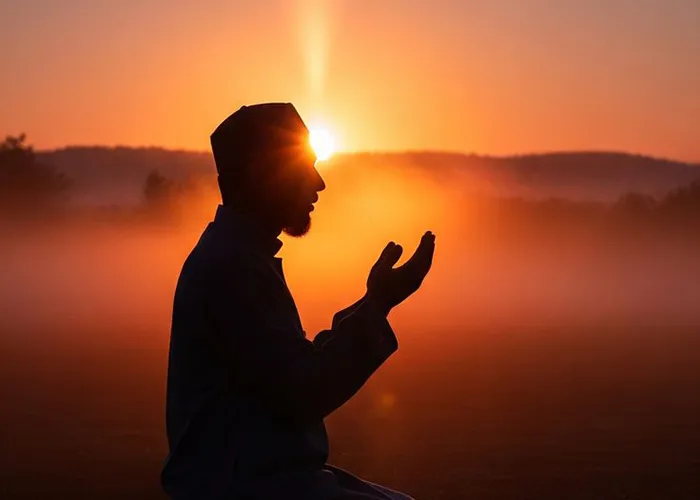Rullings of Friday Prayer
Note: The detailed rulings about Friday prayer can be found in the books of practical laws approved by the Maraje (the grand jurists) such as Ayatollah Khamenei or Ayatollah Sistani etc.
Answer: The best evidence of the importance of this significant Islamic obligation, above all, is the verses of Surah al-Jumu’ah, which command all Muslims and believers to hasten towards it upon hearing the call to Friday prayer, leaving aside any business or plans that might interfere. Even if in a year when people are suffering from food shortages, they should not go after a caravan carrying provisions and instead continue attending the Friday prayer. Islamic traditions also emphasize this matter extensively. For instance, in a sermon attributed to both supporters and opposes, reported from the Prophet Muhammad (SAWAS), it is stated: “Indeed, Allah, the Blessed and Exalted, has made Friday prayer obligatory upon you. Whoever neglects it, whether during my lifetime or after my death, out of disrespect or denial, Allah will scatter his affairs and will not bless his actions. Know that his prayer will not be accepted, his charity will not be accepted, his pilgrimage will not be accepted, his fasting will not be accepted, and his good deeds will not be accepted until he repents!”
In another tradition from Imam al-Baqir (AS), it is narrated: “Friday prayer is an obligation, and gathering for it with the imam (infallible) is obligatory. If a man abandons three consecutive Fridays without a valid excuse, he has indeed abandoned three obligations, and no one abandons three obligations without an excuse except a hypocrite.”
Furthermore, in another tradition from the Messenger of Allah (SAWAS), it is stated: “Whoever attends the Friday prayer with faith and seeking reward, his sins will be forgiven, and he will begin his deeds anew.”
There are numerous narrations on this matter, it would take too long to mention all of them. Here, with reference to another tradition, we conclude this discussion:
A person came to serve the Messenger of Allah (SAWAS), saying: “O Messenger of Allah! I have prepared for Hajj many times, but I have not been granted the opportunity.” He replied: “Attend the Friday prayer, for it is the Hajj of the poor,” indicating that many blessings of the great Islamic assembly of Hajj are present in the congregation of Friday prayer.
However, it should be noted that severe condemnation is mentioned for abandoning the Friday prayer and those who neglect it are listed among the ranks of hypocrites. This is applicable only when Friday prayer is obligatory in its absolute sense, i.e., during the presence of the infallible imam and with extended hands. But in times of his absence, if Friday prayer is contingently obligatory (when there is a choice between Friday prayer and Dhuhr prayer), and it is not neglected out of disrespect or denial, then it will not be subject to such condemnation, although the greatness and extraordinary importance of Friday prayer are preserved even in this case. (Further explanation on this matter should be studied in jurisprudential texts.)
Answer: First and foremost, Friday prayer is a significant communal act of worship that encompasses the spiritual effects of rituals, such as soothing the soul, cleansing the heart from the stains of sin, and removing the blemishes of disobedience, especially with its two sermons containing various exhortations, warnings, and calls to piety and righteousness.
From a social and political perspective, Friday prayer is a grand weekly congress, second only to the annual Hajj pilgrimage, and is considered the greatest Islamic congregation. Hence, a tradition attributed to the Prophet Muhammad (peace be upon him and his family) states: “Friday is the Hajj of those who cannot perform the pilgrimage.”
In fact, Islam emphasizes three major congregations:
- Daily congregational prayers.
- Weekly congregational Friday prayers.
- Annual congregation during the Hajj pilgrimage. Among these, the role of Friday prayer is crucial, especially because one of the preacher’s duties during the Friday sermon is to address important political, social, and economic issues. Thus, this grand assembly can yield various blessings:
- Providing people with knowledge of Islamic teachings and significant social and political events.
- Creating unity and solidarity among Muslims to instill fear in their enemies.
- Reviving religious spirit and spiritual vigor among the masses.
- Encouraging cooperation to solve common problems.
For this reason, enemies of Islam have always feared a comprehensive Friday prayer where Islamic injunctions are strictly followed. Therefore, Friday prayer has always been a powerful political tool in the hands of governments. Just governance, like that of the Prophet Muhammad (SAWAS), utilized it for the benefit of Islam, while oppressive regimes, like the Umayyads, exploited it to strengthen their power base.
Throughout history, we observe cases where anyone intending to revolt against a government refrained from attending Friday prayers first. For example, in the story of Karbala, we read that a group of Shia gathered at the house of Salim ibn Sa’d al-Khuzai, and in their letter to Imam Hussain (peace be upon him), they wrote: “Noman bin Bashir, the governor of Kufa, has isolated us. We do not attend his Friday prayers, and if we know you are coming towards us, we will drive him out of Kufa.”
In “Sahifa Sajjadiyya” attributed to Imam Sajjad (AS), we read:
“O Allah! This [referring to Friday prayers and Eid al-Adha] is the station of Your caliphs, Your chosen ones, and Your trustworthy ones in the high position You have dedicated to them, which the oppressors have seized and snatched from the rightful guardians.”
Sometimes enemies of Islam poison the air with propaganda throughout the week, but with one Friday sermon and its glorious ceremony, all their efforts are thwarted, breathing fresh life into the bodies and invigorating the veins with new blood.
It should be noted that according to Shia jurisprudence, within a radius of one Farsakh (approximately 11 kilometers), establishing more than one Friday prayer is not permissible. Even those within a two-Farsakh distance from the place of congregation participate in that prayer, illustrating that practically, in any city, large or small, and its suburbs, there will not be more than one congregational Friday prayer, thus making such an assembly the largest in that region.
However, it is regrettable that these political and religious ceremonies, which could lead to great movements in Islamic societies, have become lifeless and devoid of meaning in some Islamic countries due to the influence of corrupt governments. In such cases, they have taken on the form of ceremonial events, and truly, the loss of such great assets is lamentable.
The most significant Friday prayer of the year is the one before departing for Arafat in Mecca, attended by all Hajj pilgrims from around the world. They represent the true representatives of all Muslim segments on the planet. It is appropriate for numerous scholars to study weeks and months to prepare such a sensitive sermon and present its results on that critical day, offering invaluable insight to the Islamic society and resolving significant issues.
However, it is truly distressing to see many trivial matters being discussed during these times, when almost everyone is aware of them, while fundamental issues are hardly mentioned. Should we not shed tears over missing such great opportunities and colossal assets? Should we not rise to transform them?
Answer: Friday prayer (Jumu’ah), with its necessary conditions, is obligatory for adult and sane men who are capable of attending, while it is not obligatory for travellers and elderly men. However, it is permissible for travellers to attend the Friday prayer, and likewise, women can participate in the Friday prayer, although it is not obligatory for them.
Answer: there are four conditions for Friday prayers:
- It has be with Congregational prayer.
- It has to be performed by minimum of five individuals, one as the Imam and four as followers.
- All conditions valid for daily congregational prayer have to be observed, such as aligning the rows etc.
- A minimum distance of one farsakh (11 Kilometres) between two Friday prayers. has to be maintained.
Answer: There is no doubt that the Friday prayer, like any other congregational prayer, requires the Imam to be just. However, the question arises whether there are additional conditions for the imam of Friday prayer or not?
Some believe that this prayer is among the duties of the infallible imam, or his special representative, and in other words, it pertains to the time of the presence of the infallible imam (AS). While many scholars believe that the condition for the obligation of Friday prayer is absolute, for the contingent obligation, this condition is not necessary. It is possible to establish the Friday prayer that is a substitute for the Dhuhr prayer, during the occultation of the infallible Imam. Moreover, whenever an Islamic government is established according to its conditions, it is advisable that the appointed Friday Imam be designated by the deputy of the Imam (AS), and Muslims participate in the Friday prayer as an optional obligatory act (Wajib Al-Takhe’eri).
If doubts about the Imam’s justice or certainty about his lack of justice arise after the prayer is completed, then the prayer already performed is valid, and there is no need for repeating it.
According to the verdict of Ayatollah Khamenei, the Imam for the Friday prayer leader in any part of the Islamic world should be appointed by a just Islamic ruler (Vali al-faqih).
A designated Imam for Friday prayer is permitted to lead Friday prayer in a place other than where he was appointed.
It is permissible for the designated Imam to temporarily appoint a deputy for Friday prayer but the deputy does not inherit the appointment rulings from the Jurisprudent authority.
Answer: The Friday prayer consists of two units (rak’ahs) and takes the place of the Dhuhr (noon) prayer. The two sermons (khutbahs) recited before the Friday prayer are considered equivalent to two rak’ahs. Similar to the Fajr (dawn) prayer, it is recommended to recite suratul Hamd and other surah of the Quran loudly, during the Friday prayer. It is also recommended to recite Surah Al-Jumu’ah in the first rak’ah after suratul Hamd and Surah Al-Munafiqun in the second rak’ah.
During the Friday prayer, it is recommended to perform two Qunut supplications, one before the bowing (ruku) of the first rak’ah and the other after the bowing of the second rak’ah.
Reciting two sermons before the Friday prayer is obligatory, just as it is obligatory for the preacher (khateeb) to stand when delivering the sermon. The individual delivering the sermon must be the same person leading the Friday prayer.
The preacher should raise their voice in a manner that the congregation can hear them, so the content of the sermon reaches everyone’s ears.
During the sermon, the congregation should remain silent, listen to the sermon attentively, and sit facing the preacher.
It is fitting for the preacher to be a fluent and eloquent speaker, knowledgeable about the affairs of Muslims, aware of the societal interests of the Islamic community, courageous, articulate, and firm in upholding the truth. Their actions and behaviour should reinforce the impact of their words, and their life should remind people of God.
It is appropriate for the preacher to wear clean clothes, use fragrance, walk with dignity and composure, and when ascending the pulpit, greet the people, stand facing them, and lean on a sword, bow, or staff. They should first sit on the pulpit until the call to prayer (adhan) is completed, then begin the sermon after the completion of the call to prayer.
The content of the first sermon should include praise of God and blessings upon the Prophet Muhammad (peace be upon him), followed by an admonition to piety and the recitation of a short chapter from the Quran, which should also be observed in the second sermon. In the second sermon, after sending blessings upon the Prophet, prayers should be made for the Muslim leaders, seeking forgiveness for the believers.
Furthermore, it is appropriate to address important issues related to religion and the Muslim community, both domestically and internationally, including political, social, economic, and religious matters, prioritizing as necessary, to enlighten the people and warn them of the plots of enemies, and inform them of short-term and long-term plans for safeguarding the Islamic society and thwarting the schemes of opponents.
In summary, the preacher should be vigilant, alert, knowledgeable in Islamic matters, and make the most of the opportunity provided by this grand ceremony to advance the goals of Islam and Muslims. (It should be noted that there are minor differences in the rulings and sermons of Friday prayers among different jurists, and what has been mentioned is a summary of various rulings.)
In a narration from Imam Ali al-Ridha (AS), we read: “The sermon on Friday has been legislated for the fact that Friday prayer is a public program. God wants to enable the leader of the Muslims to preach to the people, encourage obedience, warn them against divine disobedience, make them aware of what is beneficial for their religion and worldly affairs, and inform them of important news and events from various sources that affect their interests, benefits, and destiny… And two sermons have been prescribed, so that in one they glorify, praise, and sanctify God, and in the other they address needs, warnings, and prayers, and announce commands, prohibitions, and directives related to the reform and corruption of the Islamic society.”
Answer: The time for Friday prayers begins at the first decline of the sun (the beginning of noon), and it is obligatory as a precaution not to delay it from the customary early time of the noon prayer by about an hour.
Answer: At the beginning of the month of Rabi’ al-Awwal, the Prophet Muhammad (SAWAS) arrived in Madinah and on the twelfth day, which coincided with a Monday, he entered the neighbourhood of Quba. The Prophet (SAWAS) stayed there until Friday and established the Quba Mosque. He then led the Friday prayer in the vicinity of Quba among the Banu Salim tribe. This was the first Friday prayer and the first Friday sermon in Madinah, established by the Messenger of Allah (SAWAS).



